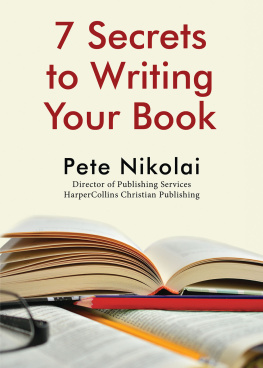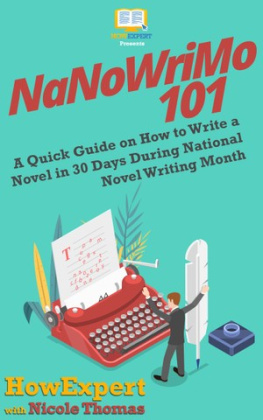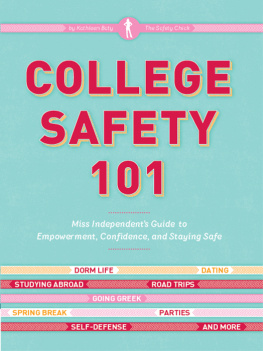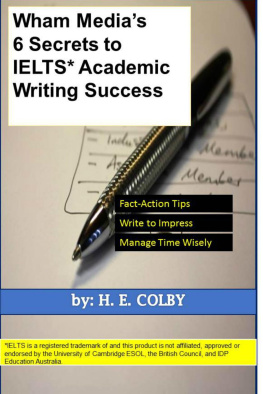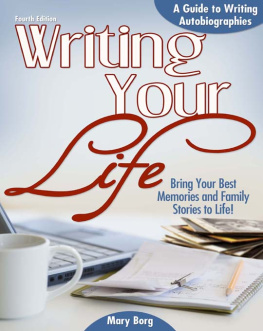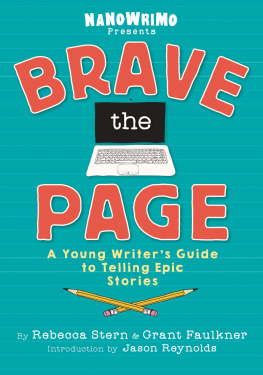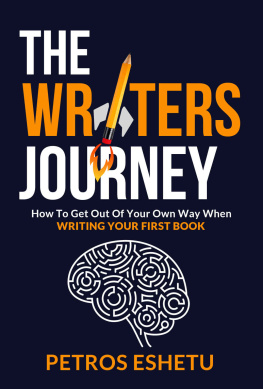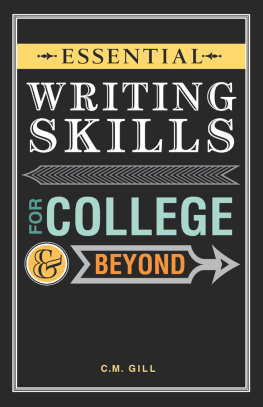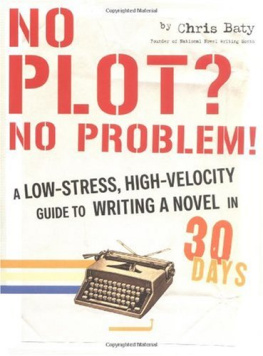NO PLOT? NO PROBLEM!
A Low-Stress,
High-Velocity Guide
to Writing a Novel
in 30 Days

Chris Baty
FOUNDER OF NATIONAL NOVEL WRITING MONTH

Text copyright 2004 by Chris Baty.
All rights reserved. No part of this book may be reproduced
in any form without written permission from the publisher.
Library of Congress Cataloging-in-Publication Data available.
eISBN: 978-1-4521-0246-7
Chronicle Books LLC
680 Second Street
San Francisco, California 94107
http://www.chroniclebooks.com
Coke is a registered trademark of The Coca-Cola Company. Dr Pepper is a registered trademark of Dr Pepper Co. Gatorade is a registered trademark of Stokely-Van Camp, Inc. Habitrail is a registered trademark of Rolf C. Hagen Corp. Jaws of Life is a registered trademark of Hale Products, Inc. Pizza Hut is a registered trademark of Pizza Hut, Inc. Post-it is a registered trademark of 3M Company. Reeses is a registered trademark of Hershey Chocolate & Confectionery Corporation. Snickers is a registered trademark of Mars, Inc. Starbucks is a registered trademark of Starbucks Corporation. Starburst is a registered trademark of Mars Inc. Taco Bell is a registered trademark of Taco Bell Corporation. Wite-Out is a registered trademark of Wite-Out Products, Inc.
FOR MY PARENTS,
who knew
it was possible
all along.
Contents
SECTION ONE
A Round-Trip Ticket to Novel-land:
Gearing up for Your Writing Adventure!
CHAPTER 1
Secret Weapons, Exuberant Imperfections, and the End of the One Day Novelist
CHAPTER 2
Time-Finding, News-Breaking, and a Step-by-Step Guide to Transforming Loved Ones into Effective Agents of Guilt and Terror
CHAPTER 3
Noveling Nests, Magical Tools, and a Growing Stockpile of Delicious Incentives
CHAPTER 4
Cruising for Characters, Panning for Plots, and the First Exciting Glimpses of the Book Within
SECTION TWO
Write Here! Write Now! A Frantic, Fantastic Week-by-Week Overview to Bashing out Your Book
CHAPTER 5
WEEK ONE: Trumpets Blaring, Angels Singing, and Triumph on the Wind
CHAPTER 6
WEEK TWO: Storm Clouds, Plot Flashes, and the Return of Reality
CHAPTER 7
WEEK THREE: Clearing Skies, Warmer Weather, and a Jetpack on Your Back
CHAPTER 8
WEEK FOUR: Champagne and the Roar of the Crowd
CHAPTER 9
I Wrote a Novel. Now What?


The era, in retrospect, was very kind to dumb ideas.
The year was 1999, and I was working as a writer in the San Francisco Bay Area, drinking way too much coffee and watching the dot-com boom rewrite the rules of life around me.
Back then, it seemed entirely feasible, nay, inevitable, that my friends and I would spend three tiring years in the workforcethrowing nerf balls at each other and staging madcap office-chair racesand then cash in our hard-earned stock options, buy a small island somewhere, and helicopter off into blissful retirement.
It was a delicious, surreal moment, and in the middle of it all I decided that what I really needed to do was write a novel in a month. Not because I had a great idea for a book. On the contrary, I had no ideas for a book.
All of this made perfect sense in 1999.
In a more grounded age, my novel-in-a-month concept would have been reality-checked right out of existence. Instead, the very first National Novel Writing Month set sail two weeks later, with almost everyone I knew in the Bay Area on board.
That the twenty-one of us who signed up for the escapade were undertalented goofballs who had no business flailing around at the serious endeavor of novel writing was pretty clear. We hadnt taken any creative writing courses in college, or read any how-to books on story or craft. And our combined post-elementary-school fiction output would have fit comfortably on a Post-it Note.
My only explanation for our cheeky ambition is this: Being surrounded by pet-supply e-tailors worth more than IBM has a way of getting your sense of whats possible all out of whack. The old millennium was dying; a better one was on its way. We were in our mid-twenties, and we had no idea what we were doing. But we knew we loved books. And so we set out to write them.
BOOKISH HOOLIGANS
That love of books, I think, was the saving grace of the whole enterprise. However unseriously we had agreed to take the writing process, we had an absolute reverence for novels themselves, the papery bricks of goodness that, once pried apart, unleashed the most amazing visions in their owners. In books, wed found magical portals and steadfast companions, witnessed acts of true love and gaped at absolute evil. Books, as much as our friends and parents, had been our early educators, allowing us our first exciting glimpses into life beyond the gates of childhood.
If we loved books, we were equally awestruck by their creators. Novelists were clearly a different branch of Homo sapiens; an enlightened subspecies endowed with a monstrously overdeveloped understanding of the human condition and the supernatural ability to spell words properly.
Novelists, we knew, had it made. They got fawned over in bookstores, and were forever being pestered for insights on their genius in newspapers and magazines. They had license to dress horribly, wear decades-out-of-date hairstyles, and have their shortcomings interpreted as charming quirks and idiosyncrasies rather than social dysfunctions.
Best of all, novel writing was for them a lifetime sport, one of the few branches of the entertainment industry where you are allowed to have a career long after youve stopped looking good in hot pants.
In short, we adored novels and glorified writers, and thought that if, after a months labors, we could claim even the thinnest of alliances with that world, something mysterious and transformational would happen to us. The possibility of starting the month with nada and ending it with a book wed writtenno matter how bad that book might bewas irresistible. And though we never admitted it to one another, there was also the hope that maybe, just maybe, wed yank an undeniable work of genius from the depths of our imagination. A masterpiece-in-the-rough that would forever change the literary landscape. The Accidental American Novel. Just think of the acclaim! The feelings of satisfaction! The vastly increased dating opportunities!
The power this last point held over us, sadly, is not to be underestimated. And as a music nerd, I knew it could happen. The annals of rock and roll are filled with self-taught musicians who recorded albums first and learned how to play an instrument much later. The Sex Pistols, the Ramones, Beat Happeningthey were all inspirational examples of unpolished, untrained people who went from nobodies to kings and queens of their oeuvre through sheer exuberance.
If fantasies of screaming, headbanging fans forming mosh pits at our book signings were flitting through our minds in 1999, though, we werent admitting it to anyone. Officially, this whole month-long novel-writing thing was to be an exercise in slapdash mediocrity. The more you wrote and the less you pretended to care, the better your standing in the field.


